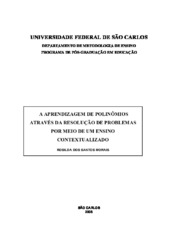A aprendizagem de polinômios através da resolução de problemas por meio de um ensino contextualizado

Ver/
Fecha
2008-03-20Autor
Morais, Rosilda dos Santos
Metadatos
Mostrar el registro completo del ítemResumen
The objective of this study was to verify how learning of polynomials took place using problem
solving in a contextualized learning situation. Thus, the present research was developed in the
context of polynomials, based on the construction of cardboard boxes, using students previous
knowledge. Based on a bibliographic review of studies on the theme, we defined the categories
of comprehension of the concepts: Contextualization, Previous knowledge, and Mathematics
teaching-learning-evaluation through problem solving. Since the phenomenon of interest in the
study is related to the school, specifically the study of polynomials, it constitutes an intervention
of a qualitative nature in a specific situation: a long-term case study. Based on Problem Solving
as a teaching-learning method in the classroom, we sought to give students the opportunity to do
hands-on mathematics , i.e. develop the content of polynomial in a way that students could
collect, experiment, and analyze, in a real-world context, subjacent mathematical patterns. All
the work was developed in an interactive situation, with the students divided into groups. This
research was carried out over the course of two projects: Project I, conducted with 6th graders in
the context of constructing cardboard boxes Polynomials and the operations defined by them
(2006); and Project II, conducted with same students one year later, in 8th grade Appropriation
of concepts constructed in Project I, and the exploration, based on this work, of the important
algebraic concept known as Function . Analyzing the work carried out, we found that the
development of the concept polynomial , followed by the concept function , using the
manipulation of concrete materials, resulted in more meaningful learning for the students.
Starting with a concrete situation, followed by generalization and abstraction in a higher stage of
learning, the students, as co-constructors of knowledge, were able to establish relations between
the themes addressed throughout the work, within a broader system, where meanings and
conventions were being established.